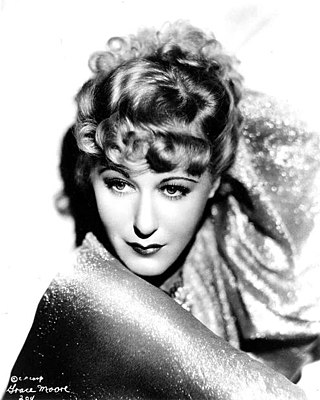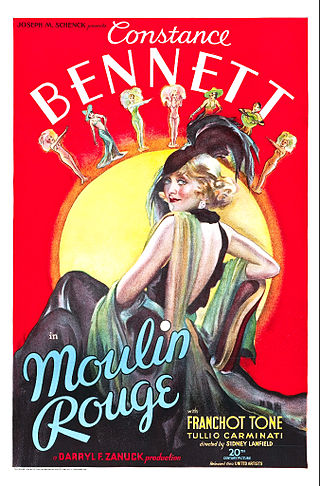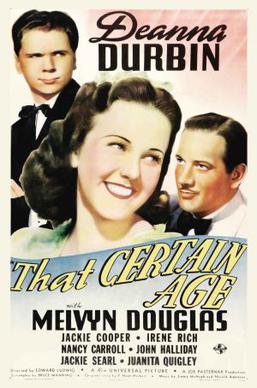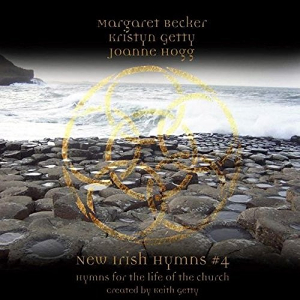
Mary Willie Grace Moore was an American operatic lyric soprano and actress in musical theatre and film. She was nicknamed the "Tennessee Nightingale." Her films helped to popularize opera by bringing it to a larger audience. She was nominated for the Academy Award for Best Actress for her performance in One Night of Love.

Swing Time is a 1936 American musical comedy film, the sixth of ten starring Fred Astaire and Ginger Rogers. Directed by George Stevens for RKO, it features Helen Broderick, Victor Moore, Betty Furness, Eric Blore and Georges Metaxa, with music by Jerome Kern and lyrics by Dorothy Fields. Set mainly in New York City, the film follows a gambler and dancer, "Lucky" (Astaire), who is trying to raise money to secure his marriage when he meets a dance instructor, Penny (Rogers), and begins dancing with her; the two soon fall in love and are forced to reconcile their feelings.

"Danny Boy" is a song with lyrics written by English lawyer Frederic Weatherly in 1910, and set to the traditional Irish melody of "Londonderry Air" in 1913.

"Carolina in the Morning" is a popular song with words by Gus Kahn and music by Walter Donaldson, first published in 1922 by Jerome H. Remick & Co.

Rebecca of Sunnybrook Farm is a 1938 American musical comedy film directed by Allan Dwan, and written by Don Ettlinger, Karl Tunberg, Ben Markson and William M. Conselman, the third adaptation of Kate Douglas Wiggin's 1903 novel of the same name.

Babes in Arms is the 1939 coming of age American film version of the 1937 Broadway musical of the same title. Directed by Busby Berkeley, it stars Mickey Rooney and Judy Garland, and features Charles Winninger, Guy Kibbee, June Preisser, Grace Hayes, and Betty Jaynes. It was Garland and Rooney's second film together as lead characters after their earlier successful pairing in the fourth of the Andy Hardy films. The film concerns a group of youngsters trying to put on a show to prove their vaudevillian parents wrong and make it to Broadway. The original Broadway script was significantly revamped, restructured, and rewritten to accommodate Hollywood's needs. Almost all of the Rodgers and Hart songs from the Broadway musical were discarded.

Sunny is a 1941 American musical film directed by Herbert Wilcox and starring Anna Neagle, Ray Bolger, John Carroll, Edward Everett Horton, Grace Hartman, Paul Hartman, Frieda Inescort, and Helen Westley. It was adapted by Sig Herzig from the Jerome Kern-Oscar Hammerstein II musical play Sunny. It is the second film version of the musical; the first was Sunny, made in 1930.

Helen Westley was an American character actress of stage and screen.

Roberta is a 1935 American musical film released by RKO Radio Pictures and directed by William A. Seiter. It stars Irene Dunne, Fred Astaire, Ginger Rogers, and features Randolph Scott, Helen Westley, Victor Varconi and Claire Dodd. The film was an adaptation of the 1933 Broadway musical Roberta, which in turn was based on the novel Gowns by Roberta by Alice Duer Miller. It was a solid hit, showing a net profit of more than three-quarters of a million dollars.
Ben Oakland was an American composer, lyricist, and pianist, most active from the 1920s through the 1940s. He composed mainly for Broadway and vaudeville, though he also worked on several Hollywood scores including for the film My Little Chickadee.

Moulin Rouge is an American pre-Code musical film released on January 19, 1934, by United Artists, starring Constance Bennett and Franchot Tone. It contained the songs "Coffee in the Morning and Kisses in the Night", and "Boulevard of Broken Dreams" with music by Harry Warren and lyrics by Al Dubin. Lucille Ball appears in an uncredited role as a show girl in the film. It has no relation to any other films of/with the same name. The cast also includes Tullio Carminati, Helen Westley, Russ Brown, Hobart Cavanaugh and Georges Renavent.

That Certain Age is a 1938 American musical film directed by Edward Ludwig and starring Deanna Durbin and Melvyn Douglas. Based on a story by Aleen Leslie (Wetstein) that was adapted by F. Hugh Herbert, the film is about a dashing reporter who returns from covering the Spanish Civil War and is invited to spend time at his publisher's home, where his adolescent daughter develops a crush on him. The family does their best to sway the young girl's feelings away from the reporter, but it is a challenge, as she is at "that certain age". Distributed by Universal Pictures, the film received Academy Award nominations for Best Music and Best Sound Recording.

Mary, Queen of Scots, has inspired artistic and cultural works for more than four centuries. The following lists cover various media, enduring works of high art, and recent representations in popular culture. The entries represent portrayals that a reader has a reasonable chance of encountering rather than a complete catalogue.

New Irish Hymns 4: Hymns for the Life of the Church is the fourth and final album in a series of themed albums created and produced by Keith Getty. This album features vocalists Margaret Becker, Joanne Hogg, and Kristyn Getty performing songs by Keith Getty and others. Margaret Becker and Joanne Hogg performed on all four albums in the series. Kristyn Getty performed on nos. 2-4; printings before her marriage to Keith Getty used her maiden name, Kristyn Lennox.
Mary Hannah (May) Brahe was an Australian composer, best known for her songs and ballads. Her most famous song by far is "Bless This House", recorded by John McCormack, Beniamino Gigli, Lesley Garrett and Bryn Terfel. According to Move.com.au: "She was the only Australian woman composer to win local an international recognition before World War II," having "290 of her 500 songs published. Of these, 248 were written under her own name, the remainder under aliases.
New Moon is a 1930 black-and-white American, pre-Code romantic/drama/melodrama musical film version of the operetta The New Moon, with music by Sigmund Romberg and book and lyrics by Oscar Hammerstein II and others. The original stage version premiered on Broadway in 1928. The 1930 film is also known as Komissa Strogoff in Greece, Nymånen in Denmark and Passione cosacca in Italy. A second adaptation, also titled New Moon, was released in 1940.

Dangerous Nan McGrew is a 1930 Pre-Code American musical comedy film starring Helen Kane, Victor Moore and James Hall and directed by Malcolm St. Clair.
"Siboney", also known as "Canto Siboney", is a 1927 song by Cuban composer Ernesto Lecuona. It was part of the 1927 revue La tierra de Venus, which featured singer Rita Montaner. The music is in cut time, originally written in C major. The lyrics were reportedly written by Lecuona while away from Cuba and is about the homesickness he was experiencing. The term "Siboney" refers to one of the indigenous tribes that inhabited Cuba before the arrival of the Spanish colonists and acts as a symbol for the island.

So This Is Love is a 1953 American musical drama film directed by Gordon Douglas, based on the life of singer Grace Moore. The film stars Kathryn Grayson as Moore, and Merv Griffin. The story chronicles Moore's rise to stardom from 1918 to February 7, 1928 when she made her debut at the Metropolitan Opera.
The 2002 New Year Honours in New Zealand were appointments by Elizabeth II in her right as Queen of New Zealand, on the advice of the New Zealand government, to various orders and honours to reward and highlight good works by New Zealanders, and to celebrate the passing of 2001 and the beginning of 2002. They were announced on 31 December 2001.














